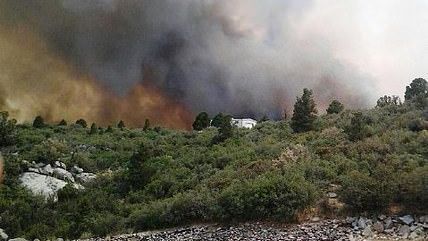Robert Reich Holds Seance With Dead Arizona Firefighters, Pronounces Them Refutations of Ayn Rand


The 19 Granite Mountain Hotshots who died in the Yarnell Hill Fire were based just 50 miles away from me, but I didn't know any of them. Neither did former Secretary of Labor Robert Reich, though he seems to have dusted off his ouija board to interview them about their values and motivations. That's the only explanation I can find for his column at Salon, "Ayn Rand could have learned from the Arizona firefighters," in which he pronounces them paragons of selflessness for the final sacrifice they made amidst a roaring wildfire, and therefore, refutations of Ayn Rand's whole philosophy.
Writes Reich:
It's worth pondering that the 19 firefighters who died Sunday battling a huge wildfire near Prescott, Arizona, presumably were motivated by something other than rational self-interest. Like the first-responders to 9/11 and other emergencies, and members of the armed forces, they put themselves in harm's way (or chose a job that did so) because they wanted to serve.
Economics, and much of public policy and political strategy, assume that people are motivated by self-interest, that the definition of acting rationally is to maximize what you want for yourself, and that other values – service, duty, allegiance to others, morality, and shared ideals – are either irrelevant or negligible.
Ayn Rand, the philosophical guru of the modern Republican Party, popularized this view of human nature. In her world, selfishness is the only honest and justifiable motive. By looking out for Number One, we accomplish everything that's necessary. Economist Milton Friedman extended the logic: The magic of the marketplace can be relied on to allocate resources to their highest and best uses. Anything "public" is suspect.
First of all, while I'm not necessarily an Ayn Rand acolyte, I know that Reich's presentation of Rand's concept of rational self-interest is cartoonish. According to the Atlas Society, which actually subscribes to Rand's beliefs:
The Objectivist ethics rebuilds morality from the ground up. "You cannot say 'I love you' if you cannot say the 'I'," wrote Ayn Rand. According to Objectivism, a person's own life and happiness is the ultimate good. To achieve happiness requires a morality of rational selfishness, one that does not give undeserved rewards to others and that does not ask them for oneself.
That doesn't negate doing for others at all — it means that you consider others without devaluing yourself. That's rather different than "[b]y looking out for Number One, we accomplish everything that's necessary."
Second … How in hell does Reich know what motivated 19 different people he never met? He starts off by asserting they "presumably were motivated by something other than rational self-interest," as if that's a logical given for anybody who does such work. As I wrote above, I didn't know any of the Granite Mountain Hotshots, but the hotshots I've known (and they play an important role in tinder-dry Arizona) are motivated at least as much by love of the job — its thrill and challenges — as by a desire to serve the community. Of course, in working jobs that they love, they guarantee that they dedicate themselves to their work and so give the best possible service to those who rely on their firefighting skills.
Don't just take my word for it that many hotshots work jobs that they enjoy, rather than fulfilling Reich's fantasy of martyrs to the collective. In describing two cousins who died in the fire, Robert Caldwell and Grant McKee, their friend Zoltan Teglas says of them, "Fearless, feisty, always like an adrenaline junkie, like a lot of these firefighter guys are just like that."
We get an even clearer picture from current firefighters describing the life:
Former hot shot and current Sioux City firefighter, Jeff Bentson, talked about what it's like being on the front lines.
"You're looking for the biggest, hottest fire. The bigger the fire, the hotter the fire, the more excited you are to go up there and fight it," Bentson said.
Bentson said the training he went through as a hot shot was rigorous. He hiked six to 10 miles a day with gear on.
But, for him it was all worth it to pursue his passion. Something, he said, was probably similar for those fallen firefighters.
"Adrenaline junkies. That's what I was when I was there. You just, that's just what you want to do. It's a fun job. It's a dangerous job. These kids were doing, I guarantee you, all of them were doing what they loved to do and unfortunately, it turned out to be a bad situation for them," Bentson said.
Two former firefighters who have experience putting out wildfires said for them it was an adventure.
"We always felt like we were the first human to step foot in this part of the United States, in some of the most beautiful parts of the country, yet it's been turned black due to fire," Sohl said.
"I think it's for the adventure and chance to see different parts of the country and camaraderie with the crew," Deputy Director for Woodbury County Conservation Board Mark Peterson said.
I'm not minimizing the losses suffered by these firefighters, their families and their friends when I emphasize that the hotshots who died in the Yarnell Hill Fire very likely loved their work and eagerly sought their jobs. To the contrary, the loss is that much greater because they enjoyed what they did, and that enjoyment probably enhanced their lives, even as their labors were so valuable to the community around them.
Robert Reich may think otherwise, but I think it's great that we live in a world where people find personal fulfillment in seeking out and doing dangerous and valuable work. Everybody benefits from that much more than they would if, instead, they set aside their preferences "to be part of something larger than themselves" as Reich would wish.


Show Comments (174)